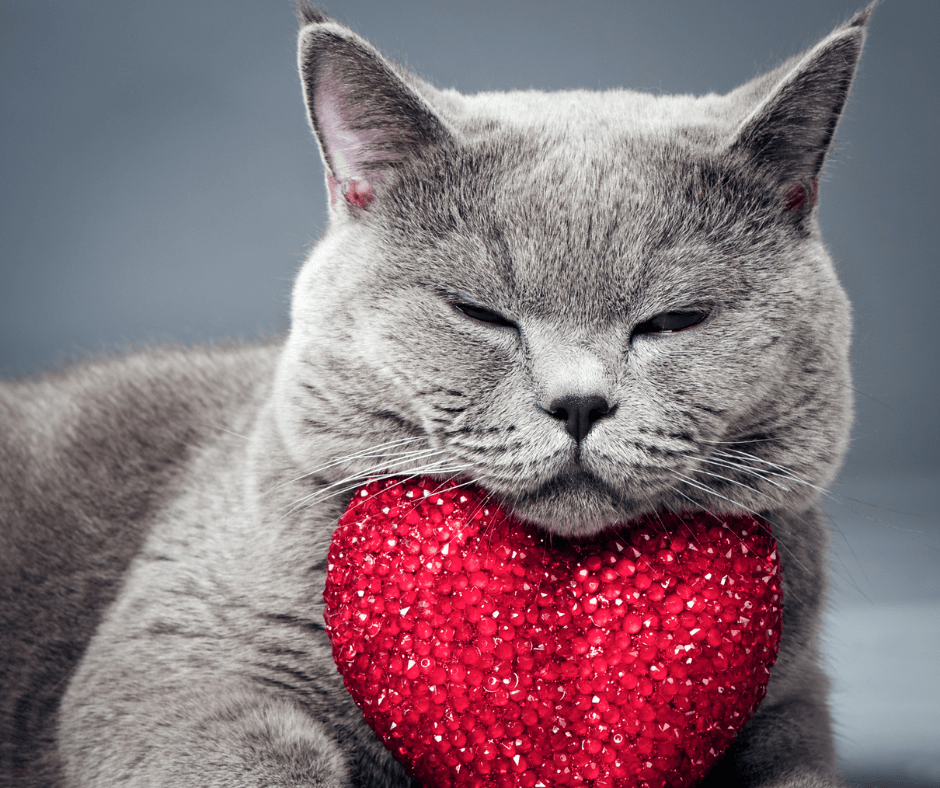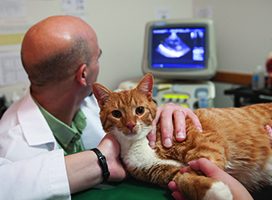What is Heart Disease?
«Heart disease» is an umbrella term used to describe a variety of disorders that impact the heart and lead to abnormal cardiac function. Cats can suffer from one or more types of heart disease simultaneously.
There are four chambers in the heart. The upper chambers are the left atrium and right atrium, and the lower chambers are the right ventricle and left ventricle. Oxygenated blood makes its way from the lungs to the left side of the heart, which pumps it through the body to be delivered to tissues and cells.
Heart disease severely affects the heart’s ability to circulate blood. While valvular heart diseases can cause the blood to flow in the wrong direction, heart disease of the muscles can keep the muscles from contracting as required.

What are the Types of Heart Disease in cats?
Adult-onset cardiomyopathy is caused by the enlargement or thickening of the heart, and it is the most common type of heart disease in cats.
This type of heart disease can be either congenital or acquired.
Congenital heart disease is present at birth and can be inherited.
Acquired heart disease is also known as adult-onset heart disease and happens to middle-aged or older cats due to wear and tear on the heart. It can also occur as a result of infection or injury.
In some cases, cats develop adult-onset heart disease as a secondary problem, with the primary issue originating in another area of the body such as the thyroid gland.
What are the Signs of Heart Disease in cats?
Early onset of heart disease can be difficult to identify in cats. Most cats do not display any clinical symptoms until the disease has progressed, at some point, you may notice your cat become lethargic and withdrawn.
Not every cat will develop all these symptoms, and many will display more than one.
How Can I Tell if My Cat Has Heart Disease?
If your veterinarian hears a heart murmur (an abnormal sound created during a heartbeat) or arrhythmia during your cat’s physical exam, they may suspect heart disease.
While blood normally flows in a smooth path through the heart, heart disease can cause abnormal blood flow, resulting in turbulence or blood being directed incorrectly through the heart valve (leaky valve), both generate a heart murmur.
An arrhythmia is an irregular heartbeat.
You may be able to see more severe signs of heart disease in your cat at home:
Both of these are emergencies and your cat should be examined by a veterinarian as soon as possible.
How is heart disease diagnosed in cats?
While arrhythmias and heart murmurs can point to an issue with your cat’s heart, they do not tell us exactly what is the problem.
If you have noticed any of the symptoms listed above in your pet, get in touch with your veterinarian to book an appointment for an exam. Primary vets can refer you and your pet (whether cat or dog) to a certified veterinary cardiologist, who specializes in diagnosing and treating cardiovascular disease in small animals.
To determine the specific type of heart disease and plan treatment options, several tests may be run, including:
An echocardiogram (heart ultrasound) will help your veterinarian obtain a definitive diagnosis.
How is Heart Disease Treated in cats?
Unfortunately, there is no cure for hypertrophic cardiomyopathy in cats, and damage caused to the structure of the heart muscle is irreversible. However, in some cases where heart disease is secondary to a treatable condition, such as hyperthyroidism, the symptoms can be alleviated once the primary condition is addressed.
Your pet cardiologist may prescribe different types of medication to help reduce the risk of congestive heart failure in cats. These medications can help relax the heart muscle, slow down the heart rate, and decrease the heart workload. Diuretics are usually prescribed to reduce fluid overload.
In addition to medication, other types of treatment may be recommended by your vet, including a low-sodium diet, oxygen therapy, taurine supplementation, or surgical procedures to remove excess fluid buildup from the chest cavity or abdomen.
Is Heart Disease Painful for Cats?
Some cats with heart disease can develop a painful, paralyzing condition called saddle thrombus. This condition is caused when a blood clot develops in the heart and moves out of the aorta blocking blood flow to a cat’s hind legs. If you notice sudden hind leg paralysis in your cat contact your vet or seek emergency care immediately.
How Long Do Cats Live After Being Diagnosed with Heart Disease?
Cats with structural heart disease will likely develop recurrent signs of congestive heart failure over time and require lifelong medication. In general, the average survival time after a cat has been diagnosed with congestive heart failure is 6 to 12 months.
Cats diagnosed with congestive heart failure will need frequent veterinary follow-up visits and additional tests may be performed to monitor the cat’s heart health.
What Are Common Complications of Feline Heart Disease?
While some cats with mild heart disease can live a stable, normal life, others can develop complications as a result of moderate or severe disease of the heart. It is challenging and sometimes impossible to predict which cats will develop complications and which will not. The most common complications include:
Congestive Heart Failure
This life-threatening condition occurs when the heart cannot pump blood effectively through the body and the veins become excessively full. Fluid will leak from the veins into other areas of the body. In cats, this excess fluid is often discovered in the lungs or chest cavity.
Radiographs can be used to diagnose CHF and treatment will involve medications to reduce the amount of fluid in the body. Fluid is sometimes drawn from the chest with a needle and syringe. Your cat should see a veterinary cardiologist as soon as possible whenever CHF is suspected.
Thrombus
When the heart is diseased, blood flows much slower, resulting in thrombus (blood clots). These clots can become lodged in essential arteries, like those that reach the legs, lungs, intestines, kidneys, or the heart itself.
A clot can also become lodged at the end of the aorta (the main blood vessel extending from the heart), which will obstruct blood flow to the rear legs. This can lead to paralysis, a severely painful condition, and a veterinary emergency that requires immediate attention.
While a thrombus is difficult to treat, some cats can recover. That said, other clots are then likely to develop. Cats with more severe heart disease are more susceptible to developing clots, though all forms of cardiomyopathy can cause these. An echocardiogram can help to determine whether your cat’s heart disease is severe enough to lead to clots.
Hypertension
Blood pressure is measured in cats using a pediatric blood pressure cuff and a Doppler monitor. Also known as high blood pressure, hypertension in cats can lead to neurological damage, kidney damage, blindness, and/or worsening heart disease if left untreated. Hypertension is most often seen with hypertrophic cardiomyopathy (HCM).
How Can Early Onset Symptoms of Heart Disease Be Identified?
The most important thing to know when it comes to monitoring heart health in cats is that veterinarians can often identify heart disease before symptoms occur. Taking your cat to the vet annually for a complete physical examination and blood tests is highly effective at screening your pet for other diseases that can affect her heart.
Veterinary Cardiology
While your family veterinarian can diagnose and treat many problems well, heart disease and other conditions require specialized care and diagnostics to optimize the outcome for your pet.
Only vet cardiologists with a progressive cardiology department can treat well heart disease. It needs advanced medical, interventional, and surgical care for cats and dogs with this disease, and a trained veterinarian to diagnose and treat cardiovascular disease in pets.
A customized plan for your pet should be created to ensure they get the care they need so they live a long, happy life.
Scheduling Cardiology Tests For Your Cat
If you suspect that your feline friend might be at risk for, or suffering from any heart conditions, please contact your veterinarian immediately to schedule an appointment urgently.

| печенье | Продолжительность | Описание |
|---|---|---|
| cookielawinfo-checkbox-analytics | 11 месяцев | This cookie is set by GDPR Cookie Consent plugin. The cookie is used to store the user consent for the cookies in the category "Analytics". |
| cookielawinfo-флажок-функционал | 11 месяцев | The cookie is set by GDPR cookie consent to record the user consent for the cookies in the category "Functional". |
| cookielawinfo-checkbox-necessary | 11 месяцев | This cookie is set by GDPR Cookie Consent plugin. The cookies is used to store the user consent for the cookies in the category "Necessary". |
| cookielawinfo-checkbox-others | 11 месяцев | This cookie is set by GDPR Cookie Consent plugin. The cookie is used to store the user consent for the cookies in the category "Other. |
| cookielawinfo-флажок-производительность | 11 месяцев | This cookie is set by GDPR Cookie Consent plugin. The cookie is used to store the user consent for the cookies in the category "Performance". |
| просмотрено_cookie_policy | 11 месяцев | Файл cookie устанавливается плагином GDPR Cookie Consent и используется для определения того, дал ли пользователь согласие на использование файлов cookie. Он не хранит никаких личных данных. |